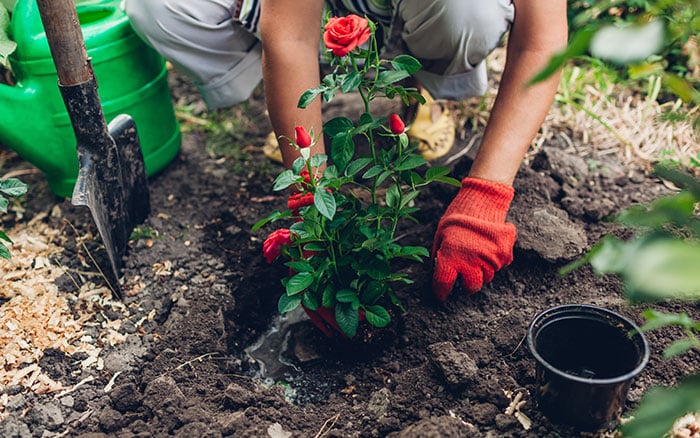Updated 10/04/25
Roses fill the air with their delicate scent, and delighting the eyes with their gloriously coloured flowers. But if you need to transplant a rose for any reason, here is my guide to make it a smooth transition.
Digging up and moving a rose bush when it’s in full flower may not seem a sensible thing to do, but you might have no option. When moving house or having an extension built, you’ll want to move the rose.
Whatever the reason it is possible to transplant a rose at any time of the year. Although, ideally it should be moved between October and February when the plant is dormant. So, if you have a choice, ideally do it between those months.
Dormant season
If you can, move the rose when it’s dormant between October and February. Before you start, dig the new planting hole where the rose is being moved to. Then it can be planted straight into it.
Prepare the soil well by digging over the area where the rose is to be planted. Then, remove large stones and add well-rotted organic matter. Cut the rose back to about 30-45cm and dig it up with as many roots as possible and as much of the long tap roots as practical. These tap roots are recognisable as they look like fangs.
Make sure that the roots never dry out between digging up and replanting. So have either an empty compost bag or hessian sack ready to place the newly dug up rose. Do so immediately, as you remove it from the soil.
After replanting, water it in well. Bear in mind that, if it’s a repeat flowering rose, it’s very likely that it will grow and flower later that year if you’re moving the plant in early summer. However, if it’s a once flowering rose it’s unlikely to flower until the following year.

Summer season
If you must move the rose during the summer months, there’s one main difference when planting. It’s the same method as for when the plant is dormant, except you’ll need to remove all the leaves after you’ve cut it back hard.
Also, make sure to water the plant thoroughly the day before you’re due to dig it up so it’s fully hydrated. Dig the rose up first thing in the morning and leave it in a bucket soaking all day and overnight.
Replant the rose the following day, preferably in the morning. It’s very important to cut it back hard and water it in well and then regularly after replanting it.

Whatever the reason for transplanting a rose, do it with care and bear in mind the time of year you’re carrying it out. When it’s in its new position, keep on top of care to help the plant establish and settle in.
For more great gardening advice, make sure you head to my YouTube Channel. Make sure you’re subscribed with notifications on so you don’t miss any of my new videos.
Frequently Asked Questions
1 – When is the best time to transplant a rose?
Ideally, move your rose between October and February whilst the plant is dormant and less likely to suffer stress.
2 – Can I transplant a rose in summer?
Yes, but it’s riskier. Water thoroughly before and after, remove leaves, and soak the roots before replanting.
3 – Should I cut the rose back before moving it?
Yes. Always prune the rose back to 30-45cm to reduce stress and help it focus on root recovery.
4 – What should I do if the roots are exposed?
Immediately wrap the rootball in a compost bag or hessian sack to keep moisture in and prevent drying out.
5 – Can I move a rose that’s already flowering?
Yes, though it’s not ideal. With extra care, many roses will survive and even continue flowering later that season.

Leave A Comment